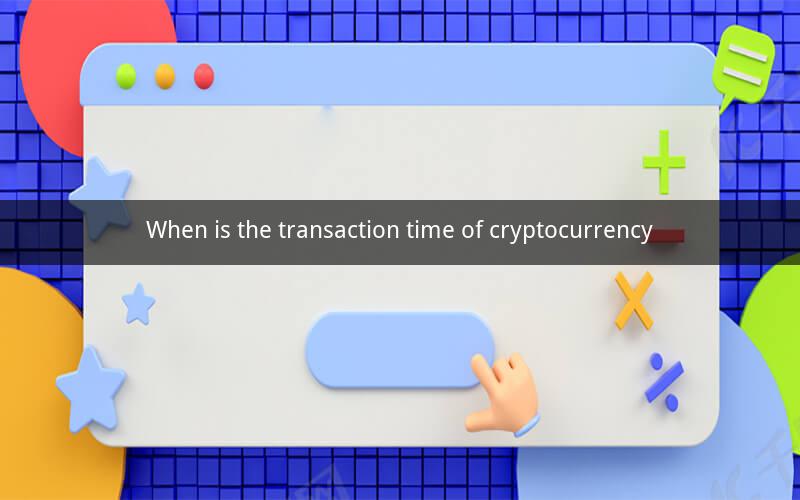
Table of Contents
1. Introduction
2. Understanding Cryptocurrency
3. Factors Affecting Transaction Time
4. Blockchain Technology
5. Confirmation Time
6. Transaction Fees
7. Network Congestion
8. Transaction Speed in Different Cryptocurrencies
9. Enhancing Transaction Speed
10. Conclusion
1. Introduction
Cryptocurrency has become a popular form of digital currency that operates independently of a central bank. When it comes to cryptocurrency transactions, understanding the transaction time is crucial for users. This article will explore the various factors that affect the transaction time of cryptocurrency, the blockchain technology behind it, and ways to enhance transaction speed.
2. Understanding Cryptocurrency
Cryptocurrency is a digital or virtual asset designed to work as a medium of exchange. It uses cryptography to secure transactions, control the creation of additional units, and verify the transfer of assets. Unlike traditional currencies, cryptocurrencies are decentralized and operate on a technology called blockchain.
3. Factors Affecting Transaction Time
Several factors can affect the transaction time of cryptocurrency, including:
- Confirmation time: The time it takes for a transaction to be confirmed by the network.
- Transaction fees: The amount of cryptocurrency paid as a fee to miners for processing the transaction.
- Network congestion: The number of transactions being processed simultaneously on the network.
- Cryptocurrency: Different cryptocurrencies have varying transaction times.
4. Blockchain Technology
Blockchain technology is the backbone of cryptocurrency. It is a decentralized ledger that records all transactions in a chain of blocks. Each block contains a set of transactions, and once a block is added to the chain, it cannot be altered or deleted. This ensures the security and transparency of cryptocurrency transactions.
5. Confirmation Time
Confirmation time refers to the time it takes for a transaction to be confirmed by the network. The first confirmation usually takes about 10 minutes for Bitcoin and other cryptocurrencies with similar block times. However, the time can vary depending on the network congestion and the number of transactions being processed simultaneously.
6. Transaction Fees
Transaction fees are paid to miners for processing transactions. Higher fees can encourage miners to prioritize transactions, leading to faster confirmation times. However, transaction fees can be expensive during times of high network congestion.
7. Network Congestion
Network congestion occurs when there are more transactions than the network can handle. This can lead to longer confirmation times and higher transaction fees. Network congestion is more common during times of high demand for a particular cryptocurrency.
8. Transaction Speed in Different Cryptocurrencies
Different cryptocurrencies have varying transaction times. For example, Bitcoin and Ethereum have longer confirmation times compared to Litecoin and Dash. This is due to their block time, which is the time it takes for a new block to be added to the blockchain.
9. Enhancing Transaction Speed
Several ways can be used to enhance transaction speed:
- Use a cryptocurrency with a faster block time, such as Litecoin or Dash.
- Pay higher transaction fees to encourage miners to prioritize your transaction.
- Use a lightweight wallet that doesn't download the entire blockchain.
- Ensure that your transaction is correctly formatted and doesn't contain errors.
10. Conclusion
Understanding the transaction time of cryptocurrency is essential for users. By considering the factors that affect transaction time and utilizing strategies to enhance transaction speed, users can ensure a smoother and more efficient cryptocurrency experience.
Questions and Answers:
1. What is cryptocurrency?
Answer: Cryptocurrency is a digital or virtual asset designed to work as a medium of exchange.
2. What is blockchain technology?
Answer: Blockchain technology is a decentralized ledger that records all transactions in a chain of blocks.
3. How does transaction time affect cryptocurrency users?
Answer: Transaction time affects users by determining how quickly they can send and receive cryptocurrency.
4. What is the confirmation time for a cryptocurrency transaction?
Answer: The confirmation time for a cryptocurrency transaction is the time it takes for the network to confirm the transaction.
5. Why are transaction fees important?
Answer: Transaction fees are important as they incentivize miners to process transactions.
6. What causes network congestion in cryptocurrency?
Answer: Network congestion occurs when there are more transactions than the network can handle simultaneously.
7. How do different cryptocurrencies compare in terms of transaction time?
Answer: Different cryptocurrencies have varying transaction times due to their block time and network congestion.
8. What can users do to enhance transaction speed?
Answer: Users can enhance transaction speed by using a cryptocurrency with a faster block time, paying higher transaction fees, or using a lightweight wallet.
9. Why are transaction fees higher during times of high network congestion?
Answer: Transaction fees are higher during times of high network congestion to incentivize miners to process transactions quickly.
10. What are the benefits of understanding cryptocurrency transaction time?
Answer: Understanding cryptocurrency transaction time allows users to make informed decisions, optimize their transactions, and avoid unnecessary delays.